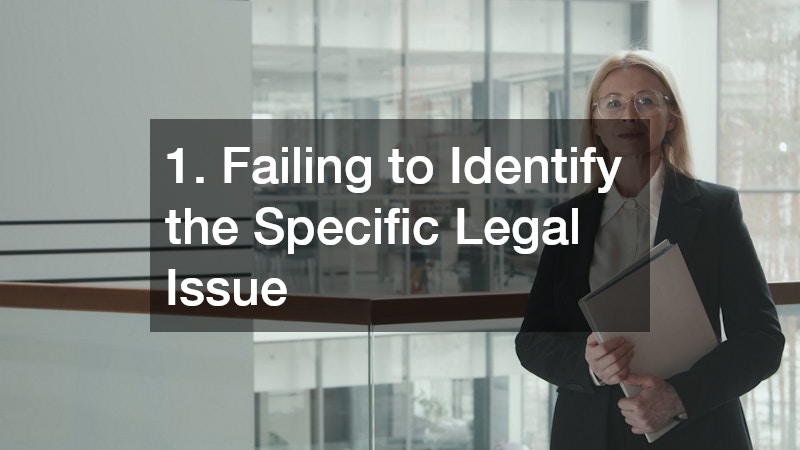In an increasingly complex world, seeking legal advice has become a crucial step in various personal and professional matters. Whether you’re dealing with issues related to criminal law, real estate, or personal injury, understanding when and how to seek legal counsel can be daunting. However, there are common pitfalls that people often encounter when reaching out for legal assistance. This article aims to highlight these mistakes, providing clarity and guidance for anyone in need of legal counsel. By addressing the key errors made by many individuals, we hope to steer you towards making more informed decisions when engaging with a lawyer or law firm. Whether your issues require the expertise of a domestic violence attorney or a social security disability lawyer, being aware of these missteps will enable you to navigate the legal landscape more effectively. To ensure a smooth process and better results, it’s important to approach your legal concerns with the right knowledge and strategy. Let’s delve into some of the most prevalent mistakes and how you can avoid them.
1. Failing to Identify the Specific Legal Issue

One of the first mistakes people make is failing to accurately identify the specific legal issue they are facing. Often, individuals go to a lawyer with a vague understanding of their legal problem, such as consulting a domestic violence attorney for issues better suited for family law. This can lead to wasted time and resources, as well as possible legal setbacks. Without a clear understanding of the legal question at hand, people may inadvertently enlist the services of an unsuitable attorney.
Moreover, not identifying the correct legal issue could mean missing out on crucial advice and preventative measures. For example, a domestic violence attorney might focus primarily on criminal repercussions, while your situation also requires civil orders of protection. It is critical to conduct preliminary research and understand your legal needs before seeking professional help.
Understanding your problem allows you to ask relevant questions, helping your lawyer provide more targeted assistance. The better informed you are about your own circumstances, the more effectively a lawyer can address them. Therefore, this initial step is foundational for a fruitful attorney-client relationship.
2. Not Researching Potential Attorneys
Research is crucial when choosing a legal representative. Many people make the mistake of selecting a foreclosure defense attorney without conducting sufficient research into their background and expertise. This can lead to poor representation, affecting the outcome of your legal issue. It is important to investigate potential lawyers to ensure they have the relevant experience for your specific legal case.
In today’s digital age, information on any professional is readily available. Reviews, client testimonials, and professional credentials can provide valuable insights into an attorney’s capability and reliability. A good practice is to cross-reference attorneys or law firms on multiple platforms to get a comprehensive understanding of their reputation.
Reaching out to multiple attorneys for an initial consultation is another beneficial step. It gives you a frame of reference for gauging different approaches and personalities, allowing you to find the best fit for your needs. Foreclosure defense attorney specialization won’t suffice if complex real estate issues are entwined with bankruptcy details needing unique expertise.
3. Ignoring Fee Structures
Another common mistake is ignoring the fee structures associated with hiring a lawyer. Many people enter into agreements with assault attorneys or other legal professionals without fully understanding how fees are structured. This can lead to unexpected costs and financial strain, creating further complications in the legal process. Being unaware of billing rates and additional fees may cause significant stress later on.
Different attorneys may have unique fee arrangements, such as hourly rates, fixed fees, or contingency fees. Understanding the fee structure can help you budget appropriately and avoid surprises. Discussing budget constraints upfront with your lawyer is crucial in managing expectations from the start.
By clearly understanding the financial implications beforehand, clients can be sure that they are receiving value for money. This transparency fosters a better working relationship and aligns both parties towards a successful outcome. It also minimizes the risk of financial disputes arising during or after the legal process.
4. Overlooking Specialized Expertise

Overlooking specialized expertise is a frequent error when individuals seek legal help. For instance, seeking assistance from a general practice lawyer when you need a local estate planning attorney can drastically affect the quality of advice received. Each area of law requires a distinct set of skills and knowledge due to its complexity and evolving nature. Hiring a lawyer with the right specialization ensures that you get precise and pertinent guidance.
Estate planning, corporate law, and criminal law are just a few areas where specialization significantly impacts the outcome. Professionals in these fields have a nuanced understanding of specific legal landscapes, which a general practitioner may lack. For example, a local estate planning attorney possesses the particulars of state-specific legislation that others might overlook.
Making the wrong choice can lead to overlooked opportunities for legal advantages or worse, costly mistakes. It’s imperative to choose a lawyer whose expertise aligns with your needs, ensuring a competent navigation through the legal intricacies relevant to your situation. Getting this right can be the difference between a favorable resolution and a legal misstep.
5. Waiting Until the Last Minute
Waiting until the last minute is a common issue faced when seeking legal advice. Often, people wait until their problems escalate before consulting personal injury lawyers or other legal professionals. This delay can reduce the options available and impose stricter time constraints, risking unfavorable results. Early intervention is key because it allows more time for gathering evidence, strategizing, and negotiating.
Legal processes often involve tight deadlines and require a substantial amount of preparation and documentation. Waiting too long to seek help can lead to inevitable stress and hinder achieving successful outcomes in legal matters. For instance, personal injury lawyers recommend seeking immediate legal advice after an accident to preserve evidence.
Procrastination is not just costly but could also affect the possibility of a favorable legal resolution. Promptly reaching out to legal professionals situates you better to deal with intricacies, thereby boosting your chances for success. It fosters a proactive approach rather than a reactive one, crucial in dealing with legal complexities.
6. Providing Incomplete or Inaccurate Information
When consulting a car accident lawyer or any attorney, providing incomplete or inaccurate information is a critical mistake. Full disclosure allows lawyers to understand the situation in its entirety and offer accurate advice. Holding back information or misrepresenting facts can weaken your legal position and may even backfire during legal proceedings.
Clients often underestimate the importance of transparency when working with legal professionals. Lawyers base their strategies and advice on the information provided to them, making honesty crucial to the success of your case. Even seemingly small details can have significant consequences.
Ensuring that you provide all the relevant information, no matter how trivial it may seem, is imperative. This open communication allows your attorney to build a more robust case, negotiate effectively, and potentially expedite the process. It avoids surprises that might arise during court proceedings or settlement discussions, ensuring more confidence in your legal journey.
7. Not Asking Questions

Not asking enough questions is another mistake people make when consulting with attorneys. Many individuals feel intimidated or believe they should automatically trust their criminal defense attorney to handle everything. This passive approach can lead to misunderstandings and dissatisfaction with the legal process and outcomes.
Clients should actively engage in open communication by asking relevant questions about strategies, timelines, expectations, and alternatives. Understanding how a lawyer intends to handle your case helps you stay informed and confident in their ability to advocate on your behalf. Clarifying doubts and verifying assumptions is essential to ensure everyone is aligned in their goals.
Having a clear understanding of your case and the steps involved also helps manage expectations and reduces stress. It’s critical to voice concerns or inquiries immediately rather than later, when they might result in miscommunications. By fostering open dialogue, you strengthen the attorney-client relationship, ultimately leading to a more effective legal representation.
8. Misunderstanding the Attorney-Client Relationship
Misunderstanding the dynamics of the attorney-client relationship can significantly hinder effective legal representation. Some clients expect rape attorneys or any legal professional to not only understand their case intimately but also make personal, non-legal decisions on their behalf. This can lead to tension and inefficiency in the legal proceedings.
The relationship between attorney and client should be seen as a collaborative partnership where each party understands their respective responsibilities. Clients are responsible for decision-making and providing all relevant information, while attorneys offer professional counsel and strategies. Blurring these lines can jeopardize a lawyer’s ability to advocate effectively.
Maintaining an appropriate professional relationship ensures that legal advice is respected and followed while decisions remain aligned with the client’s best interest. Misconceiving roles can lead to lack of trust or dissatisfaction, ultimately affecting the quality of the legal outcome. Understanding and maintaining this balance reinforces a respectful and results-driven partnership.
9. Skipping the Attorney Consultation
Skipping the initial attorney consultation is a potential pitfall for many individuals seeking legal advice. This step is crucial as it allows both the client and the criminal law attorney to assess whether they are the right fit for each other. During this meeting, clients can provide an overview of their situation, while attorneys can offer preliminary guidance on potential legal recourses and explain how they would approach the case. Understanding fee structures, anticipated timelines, and likely outcomes during this consultation helps clients make informed decisions without committing prematurely.
An initial consultation also allows you to gauge the attorney’s expertise, approach, and trustworthiness. Meeting face-to-face—or virtually—provides insight into how comfortable you feel communicating with the lawyer, how thoroughly they listen, and whether their strategy aligns with your goals. Skipping this step may result in hiring someone who is incompatible with your needs, which can lead to misunderstandings, dissatisfaction, and possibly poor case outcomes.
Furthermore, consultations offer the opportunity to ask critical questions about experience with similar cases, potential challenges, and the resources the attorney can access. It also gives you a sense of the lawyer’s communication style, responsiveness, and professionalism. By dedicating time to this important step, you ensure that you choose an attorney equipped to handle your case effectively, set realistic expectations, and build a strong, collaborative attorney-client relationship from the outset.
10. Underestimating the Value of Communication

Many underestimate the value of effective communication with legal professionals, like a social security disability lawyer. Timely and open communication sets the foundation for a successful legal journey, yet it is often overlooked. Frequent, transparent interaction between clients and their attorneys can significantly enhance the outcome of legal matters.
Good communication allows both parties to share updates, express concerns, and clarify objectives easily, creating a robust and collaborative working relationship. It also ensures that the client is always informed and knowledgeable about the ongoing status and direction of their case. This back-and-forth communication keeps you actively engaged and aware of any potential changes or challenges.
Ignoring communication can lead to misunderstandings, errors in documentation, or even ineffective legal representation. Fostering a communicative environment from the outset ensures that your legal interests are addressed promptly and effectively. It reinforces mutual trust, which is essential to navigating the complexities and nuances of any legal encounter.
Avoiding these common mistakes when seeking legal advice can significantly enhance the effectiveness of your legal engagements. By being informed, prepared, and proactive, individuals can navigate their legal needs with greater confidence and success. Knowledge is power, and understanding these pitfalls goes a long way in forming a more productive attorney-client relationship.
From understanding the specifics of your legal issue to actively engaging in your attorney relationship, each step in the process matters significantly. Mistakes, such as engaging a tbd or making other small legal missteps, can be costly. By consciously avoiding these pitfalls, you ensure a stronger and more coherent legal strategy.
With a more comprehensive approach, you are better positioned for a favorable legal outcome. Whether you’re dealing with foreclosure, personal injury, or any other legal matter, understanding these errors helps in creating a more successful path to resolution. By taking the time to choose the right lawyer and maintaining clear, open communication, you enhance the effectiveness of your legal endeavors, maximizing your chances for success.



